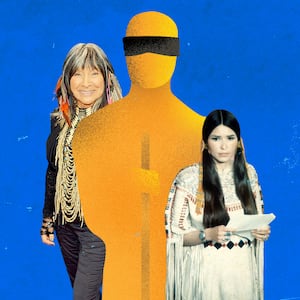A few days after she alluded to Native American “misrepresentation” at the Super Bowl, Lily Gladstone has doubled down on her criticism of the Kansas City Chiefs.
In an interview on Variety’s Awards Circuit podcast, the Killers of the Flower Moon actress said that both of this year’s Super Bowl teams—the Chiefs and the San Francisco 49ers—should be held “accountable.” But it was the Missouri-based team that she specifically called out for “that damn Tomahawk chop.”
“Honestly, you could hold both teams accountable,” Gladstone said. “The 49ers are based on the California Gold Rush, which was an incredibly brutal time for California Indians. And then the Chiefs. There are many ways that you could interpret the name ‘chief.’ It’s not the name that bothers me. It’s hearing that damn Tomahawk chop.”
The “Tomahawk chop” is a gesture and chant used at Chiefs games to rally support for the team; fans typically move their arm up and down in a chopping motion while chanting.
“Every time, it’s a stark reminder of what Hollywood has done to us,” Gladstone continued, “because the Tomahawk chop directly ties to the sounds of old Westerns where we were not playing ourselves, or if we were, we were merely backdrop actors. It’s this ‘claiming’ of that sound and saying it’s in ‘honor’ and the commodification of who we are as people. It’s great to love the game and your players, but it still hurts.”
The Kansas City Chiefs have long faced criticism over its controversial name, its arrowhead symbol logo, and the “Tomahawk chop,” all of which Native American people and activists say fuel racist stereotypes.
The Chiefs have taken some steps in recent years to get rid of offensive imagery. In 2020, the team banned fans from wearing face paint and headdresses to games, and the following year, they retired their mascot, a horse named Warpaint. But while the NFL’s Washington Commanders (formerly known as the Redskins) and the MLB’s Cleveland Guardians (formerly the Indians) have given in to public pressure and changed their monikers, the Chiefs have refused to follow suit.
Gladstone, who is of Siksikaitsitapi and Nimíipuu heritage, earned an Academy Award nomination for Killers of the Flower Moon, Martin Scorsese’s film about the early 1900s Osage Nation murders. She is the first Native American actor to be nominated in the Best Actress category at the Oscars, and throughout the entire awards season, has regularly used her platform to advocate for the Indigenous community.
Last weekend, while attending the Santa Barbara International Film Festival’s Virtuoso Awards, Gladstone opened up about her historic Oscar nomination by saying it’s “long overdue” and pointing out that “some of the first filmmakers [and] the first film footage was shot by native people documenting our way of life.”
“But that’s a lot of history and a lot of years of exclusion or misrepresentation, and I mean, Super Bowl’s tomorrow,” she said at the time. “We haven’t come that far if we look at one of the teams that’s playing.”







